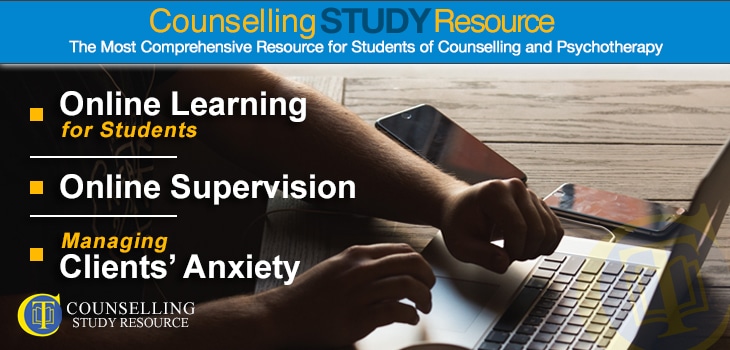COVID-19 Special 02 - Online Counselling Supervision
Online Learning for Students - Managing Clients' Anxiety
In the second COVID-19 Special of the Counselling Tutor Podcast, Ken Kelly and Rory Lees-Oakes discuss the challenges for students in switching from face-to-face to online learning-as well as online counselling supervision-and how we can help manage clients' anxiety in these very difficult times.
* BACPAC practice management software for counsellors and psychotherapists is a sponsor of the Counselling Tutor Podcast.
Get a 30-day free trial of BACPAC and a 30% discount by using the discount code CT2020
Online Learning for Students (starts at 2.10 mins)
In the UK - and in many other countries in the world - colleges and other learning institutions have now ceased all face-to-face contact, switching to online learning.
This represents a huge change for students of counselling and psychotherapy, and can feel very frustrating - and very different from the familiar style of learning. Do remember that the situation is challenging for tutors too, who are generally trying their best.
Often, students gain a great deal of reassurance and benefit from belonging to a group of peers; you may be experiencing this as a particular loss during this time.
Ken and Rory suggest creating a private group for members of each class using Facebook, WhatsApp or Yammer.
If you are participating in online learning using an audio/video link from home, do ensure that you have appropriate privacy, so as to maintain the usual confidentiality of the group.
Ken suggests that journaling can be really helpful, especially if your contacts with peers is reduced, helping you to process your thoughts and feelings.
Rory muses whether the co-counselling movement - originating from the 1950s - may gain new momentum.
Don't forget too that the Counselling Tutor Facebook page provides a forum for asking questions and discussing issues with nearly 30,000 members interested in the world of counselling and psychotherapy: students, qualified counsellors, supervisors and tutors.
Online Counselling Supervision (starts at 13.45 mins)
Clinical supervision is of course a requirement for all practising counsellors, but again face-to-face sessions are not possible in the current COVID-19 situation.
Even not having the journey to travel to and from supervision - which you may be accustomed to using for reflection - is a big change.
For online counselling supervision, Ken and Rory suggest ensuring that you use a secure platform, for example Zoom, to ensure confidentiality. Again, ensuring you can speak from a private space, where you cannot be overheard, is important.
Not all supervisors and supervisees will be familiar with online working; you can find some good videos to help you learn how to use the technology on YouTube - and you could view this as continuing professional development (CPD).
Telephone sessions may be another option if online work feels technologically daunting, though even more body-language clues are then lost: it is possible, however, to ask about bodily sensations verbally.
Exploring together how it feels to be working remotely can itself be very valuable. Last but not least, do think about how you will pay your supervisor if you are not physically present to pay in cash.
All these issues and considerations for online counselling supervision are applicable too to your own working with clients by telephone or online.
Managing Clients' Anxiety (starts at 23.15 mins)
The current situation may be magnifying prior anxiety for clients; it is a time when perhaps all of us feel heightened anxiety.
In addition to all the previous triggers for this, spending a lot of time in the home with others can in itself lead to other tensions. And there is an existential fear for all of us, wondering whether we will catch this virus ourselves - and, if we do, what will happen to us.
Indeed, while we would normally avoid counselling others who are presenting with issues that we are going through ourselves at the same time, we don't have this choice currently: parallel process is everywhere.
Given this fact, it is important for us as counsellors to be congruent with our thoughts and feelings, modelling for our clients the skill of being authentic, while also working hard to maintain own stability.
Self-care is vital in this, using supervision, taking regular breaks, peer networking (ensuring client confidentiality is not broken) and journaling.
Do ensure too that you have planned ahead professionally for how clients will be contacted if you begin to show symptoms.
Rory predicts that once the virus situation has settled down, counsellors may well see an increase in demand for their services, in particular in relation to loss/bereavement, post-traumatic stress and life-limiting health conditions.


